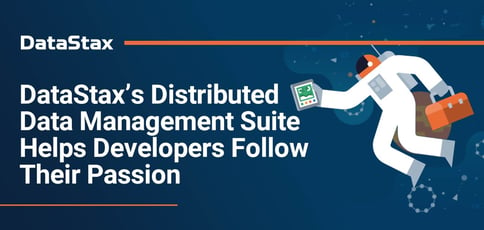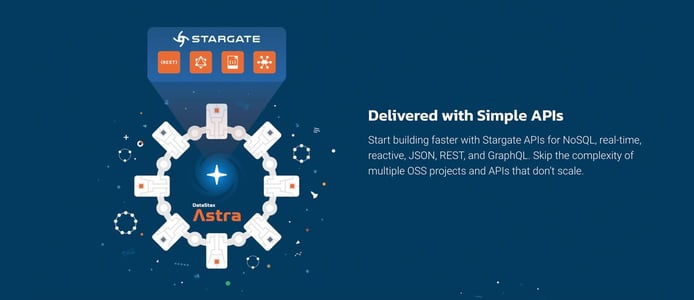
TL; DR: DataStax is a developer-centric provider of data management products, including a highly scalable, cloud-native NoSQL database built on the open-source Apache Cassandra. The company’s Database-as-a-Service (DBaaS) tool, DataStax Astra, makes it easy for enterprises to develop, host, and deploy apps without infrastructure and administration burdens. Ultimately, DataStax’s goal is to empower developers to do what they love — build innovative, data-driven applications — through the power of open-source technology.
We tend to think of software stacks and infrastructure solutions in terms of financial returns — boosting efficiency, speeding time to market, and improving operational agility.
And yes, all of those benefits are important, especially against the backdrop of a data-driven economy and rapidly evolving digital landscape.
But the best development tools and packages offer something that goes beyond dollars and cents; something more human. For developers who live, eat, and breathe code, that benefit is the ability to pursue their passions. The ones that sent them to school, the ones they saw themselves fulfilling in daydreams, the ones that help them persevere through challenges and create incredible software products.

DataStax is a developer-centric provider of data management products.
Denise Gosnell, Chief Data Officer at DataStax, told us that the perks of the distributed data management products and services her company offers go beyond ROI.
“I spend most of my days talking to developers outside of DataStax, and from those conversations, I’ve learned the real value we’re providing is in moving developers’ hearts,” Denise said. “If they’re not fighting production fires, if they’re no longer burdened by the complexity of shipping new features, they’re able to get to a level of detail where they can work closely with data that fascinates them. That’s reaching nirvana.”
Less time spent on pager duty means more opportunities to work closely with data science and engineering teams. It also clears the way for experimentation, which ultimately puts more sophisticated, considered features in the hands of real-world customers.
Proven Experience in Distributed Data Management
DataStax was founded in 2010 by Jonathan Ellis and Matt Pfeil, two engineers who had worked extensively within the open-source Apache Cassandra community. The pair initially served that community of users through the typical open-source business model of services, support, and training.
By October 2011, the company released the first version of DataStax Enterprise, a proprietary distribution of the Cassandra database management system designed for businesses. Over the years, Cassandra became increasingly popular for its ability to handle large data sets.
“It’s probably the most popular database in terms of scalability,” said Patrick McFadin, VP of Developer Relations at DataStax. “It’s used in the world’s largest workloads at places like Apple and Huawei. If you use a smartphone, you’re probably using Cassandra every day.”
Patrick said DataStax helped the business world embrace the technology, which was built by early tech adopters, from an enterprise standpoint. The next logical step in the company’s evolution was the recent introduction of Astra. The multi-cloud Database-as-a-Service (DBaaS) solution for hosting and deployment simplifies cloud-native Cassandra application development.
Today, DataStax continues to embrace its open-source roots through contributions to the Apache Cassandra project.
“Open-source permeates every one of our products,” Patrick said. “We believe in the power of open-source, and I feel like we get that balance right. It’s an essential part of our DataStax culture.”
Keeping Up with Products and Cloud Trends for Apache Cassandra
DataStax continues to excel in helping enterprises build large-scale distributed systems suitable for data-driven cloud applications. Now, the company is looking toward trends in data consumption.
“The shift we see emerging in the data world is a focus on providing context — that’s where humans start to get value from data,” Denise said. “Any piece of data you’ve ever looked at has three features: It occurred at a certain time, at a certain place, and with some type of connection to, or context with, the events around it.”
Today’s market has the first two features, time and place, cornered via readily available geolocation and time-series technologies (Cassandra plays a vital role in both areas.)
“It’s that third piece, as an industry, where we see trends from the data perspective,” Denise said. “It’s in how you deliver that context to the end-user of your app and how you architect context into your technology stack.”
As companies worldwide rush to the table with solutions, DataStax combines its vast experience in distributed data management with the open-source community forming around the concept of building context into applications.

Stargate is integrated with Astra, giving developers freedom of choice to host and deploy on-prem and in the cloud.
“The need to provide distributed coordination and deliver data the way developers want in their applications has led to the emergence of our latest open-source work, Stargate,” Denise told us. “That’s the future. That’s where we’re going with the company.”
Stargate, an open-source data gateway that sits between an app and the databases it relies on, merges an API platform and data request coordination code into one open-source project.
“It’s difficult, for example, to look at the stream of consciousness on any social media platform and start to quantify it as something measurable and meaningful,” Denise said. “It’s a fascinating problem to work with app developers on. We want to meet them with open-source technologies, using the stacks they care about, delivering an app deployment experience that’s completely serverless, in a few lines of code, in a few clicks. That’s the future we’re building.”
Enabling Rapid Digital Transformation
Today’s data-driven applications come in many flavors, from business intelligence (BI) software to inventory tracking solutions. But they all help users derive insights from data in real time. Patrick told us DataStax is helping broaden the group of developers who can work on such solutions.
“Data is changing the paradigm of how we communicate, but it shouldn’t be held by a select group of scribes at the top of the mountain, and that’s what it comes down to,” he said. “I hate to use the term democratizing data because it’s so overused. It’s more about getting the people involved; it’s a community effort now. So DataStax’s role in making data available and useful at scale for the large groups of people is a pretty great thing.”
Patrick and Denise both agreed that talking to developers and finding out how they’re using DataStax’s technology is a fun part of the job.
For example, YouTuber and software engineer Ania Kubów used DataStax to create a clone of the Tik Tok application from scratch — in just two hours. And Home Depot, which runs on DataStax, used the platform to quickly and efficiently implement a curbside pickup program in response to changing customer needs in 2020.
“Speed and time to market are critical for companies that are going through digital transformation efforts right now,” Patrick said. “They can’t have a six-month development window — it’s gotta be the next sprint. That’s the only way to survive right now.”
A Continued Focus on Stargate in Astra
As for what the future holds, DataStax will continue to focus on Stargate, which has been integrated with Astra, allowing modern data APIs to access a Cassandra-as-a-Service solution.
According to a recent blog, all Stargate APIs are supported, featuring streamlined connections, free sample apps, and a JavaScript software development kit. Developers also benefit from the freedom of choice to host and store data on the cloud solution of their choice.
“We just shipped Stargate, and that’s the direction we’re looking forward to going in the next year,” Denise said. “Stargate is bringing together what DataStax does best — anything distributed — with a community of developers who want to work with data. Stargate brings both of those together into one open-source, free project that anyone can use.”
Patrick summed up the company’s value proposition moving forward succinctly. “Data rules the world,” he said.
“Data is gold, but it’s also what moves the heart,” Denise added. “Presenting data in a meaningful way in your app helps you connect to your users. And we’re allowing developers to do that while working quickly, with tools they can depend on. Instead of being on pager duty, they get to enjoy their time off and get some sleep. Giving them that type of power is what we’re incredibly passionate about here at DataStax.”
HostingAdvice.com is a free online resource that offers valuable content and comparison services to users. To keep this resource 100% free, we receive compensation from many of the offers listed on the site. Along with key review factors, this compensation may impact how and where products appear across the site (including, for example, the order in which they appear). HostingAdvice.com does not include the entire universe of available offers. Editorial opinions expressed on the site are strictly our own and are not provided, endorsed, or approved by advertisers.
Our site is committed to publishing independent, accurate content guided by strict editorial guidelines. Before articles and reviews are published on our site, they undergo a thorough review process performed by a team of independent editors and subject-matter experts to ensure the content’s accuracy, timeliness, and impartiality. Our editorial team is separate and independent of our site’s advertisers, and the opinions they express on our site are their own. To read more about our team members and their editorial backgrounds, please visit our site’s About page.

